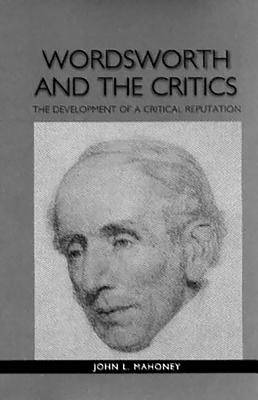
Bedankt voor het vertrouwen het afgelopen jaar! Om jou te bedanken bieden we GRATIS verzending (in België) aan op alles gedurende de hele maand januari.
- Afhalen na 1 uur in een winkel met voorraad
- In januari gratis thuislevering in België
- Ruim aanbod met 7 miljoen producten
Bedankt voor het vertrouwen het afgelopen jaar! Om jou te bedanken bieden we GRATIS verzending (in België) aan op alles gedurende de hele maand januari.
- Afhalen na 1 uur in een winkel met voorraad
- In januari gratis thuislevering in België
- Ruim aanbod met 7 miljoen producten
Zoeken
€ 177,45
+ 354 punten
Omschrijving
William Wordsworth, often regarded as the High Priest of British Romantic Poetry, certainly had the longest career of the Romantics, one extending from his days as a schoolboy almost to the end of his life in 1850, from the Lyrical Ballads and descriptive poetry of 1790s to the late poetry of the 1840s. With this long career came a remarkable history of critical reception: from the reviews of his contemporaries in journals and magazines; to the major statements of Matthew Arnold, John Stuart Mill, and others; to the amazing variety of books, essays, and theoretical approaches of the twentieth century. Although there have been a number of studies about the critical reception of Wordsworth's poetry and critical theory, Professor Mahoney's book is the first full-length study of how critics -- from the earliest reviewers to the major Victorian voices, to the enormous 20th-century response -- have approached the many facets of the great English Romantic's work. Mahoney does not aim at following the course of Wordsworth's life and career, as many admirable and recent biographies have done, but rather follows the course of a critical reputation as it has evolved from the poet's earliest probes to the present day. Thus Wordsworth and the Critics offers an engaging narrative of the reputation of this most prominent of Romantic poets. John L. Mahoney is Thomas F. Rattigan Professor of English at Boston College and has written extensively on Wordsworth and English Romanticism.
Specificaties
Betrokkenen
- Auteur(s):
- Uitgeverij:
Inhoud
- Aantal bladzijden:
- 186
- Taal:
- Engels
- Reeks:
- Reeksnummer:
- nr. 22
Eigenschappen
- Productcode (EAN):
- 9781571130907
- Verschijningsdatum:
- 15/12/2000
- Uitvoering:
- Hardcover
- Formaat:
- Genaaid
- Afmetingen:
- 152 mm x 229 mm
- Gewicht:
- 430 g

Alleen bij Standaard Boekhandel
+ 354 punten op je klantenkaart van Standaard Boekhandel
Beoordelingen
We publiceren alleen reviews die voldoen aan de voorwaarden voor reviews. Bekijk onze voorwaarden voor reviews.









